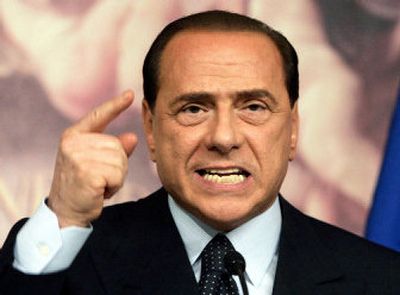Ineffective, vulgar and still in the running

ROME – In almost any other country, a candidate who compares himself to Jesus Christ, accuses the Chinese of boiling babies and denigrates his opponents as “testicles” would have a tough job getting himself elected to high office.
But this is Italy, where just such a man has run the country for the past five years. And though Prime Minister Silvio Berlusconi is trailing in the polls, perhaps the most astonishing thing about the national elections to be held here today and Monday is not that he might be ousted from his job, but that he is still in the race at all.
In what has become one of the dirtiest campaigns here in living memory, the eternally controversial Berlusconi, at the head of a center-right coalition, has waged a jaw-droppingly audacious offensive against his opponent, the blandly bureaucratic Romano Prodi, who heads a center-left coalition.
The polls have consistently given Prodi a 3 percent to 5 percent lead, but polling isn’t allowed in the last two weeks of the campaign and the last available surveys also suggested that up to a quarter of voters remained undecided, giving Berlusconi every reason to keep fighting.
“You can’t rule him out, since he’s so unpredictable,” said Lily Gruber, an Italian socialist member of the European Parliament who has been campaigning for the leftist opposition. “He says whatever he thinks he needs to say in order to get a couple more votes.”
For many Italian voters, it is an unappealing choice, between an increasingly erratic incumbent who has failed to deliver on his promises to improve Italy’s sclerotic economy and a distinctively uncharismatic challenger in the form of Prodi, nicknamed “the mortadella” by the Italian press because of his presumed resemblance to the pale pink sausage.
In the five years since Berlusconi took office, economic growth has slowed to zero, the worst performance in Western Europe. As one of America’s staunchest European allies, he committed Italian troops to the deeply unpopular Iraq War. More alarming to his critics, he has used his tenure to pass a series of laws favoring his own businesses and making it harder for magistrates to prosecute him for the many instances of corruption and tax evasion with which he has been associated, thereby cementing his position as Italy’s richest and most powerful man.
“Somebody with his record in a normal country wouldn’t even have turned up for re-election,” said Alexander Stille, a professor at the Columbia School of Journalism and the author of a forthcoming book on Berlusconi.
Yet instead of being forced to defend his record, Berlusconi has seized the initiative with a series of insults and last-minute promises to cut taxes that seem designed to scare voters into believing that a vote for Prodi will mean a vote for communism and higher taxes.
The low point of the campaign came last week, when Berlusconi denounced those who planned to vote for the opposition as “coglioni,” an Italian swear word which literally means “testicles.”
“I have too much respect for the intelligence of Italians to think that they would be such ‘coglioni’ as to vote against their own interests,” he told a gathering of shopkeepers.
The vulgarity provoked outrage.
“From a head of government, one expects responsibility and style,” sniffed a commentary by the Catholic bishops’ daily Avvenire. Leftist supporters took to the streets, carrying placards declaring “I am a coglione.”
In the context of Italy’s still fiercely polarized political landscape, however, Berlusconi’s tactics make some sense. Berlusconi’s coalition includes affiliates of the far right and Prodi’s members of the Communist Party. Because most Italians identify strongly with the left or right, it is the job of their politicians less to sway people’s already entrenched political views than to persuade their most lukewarm sympathizers to go out and vote.
A large proportion of the undecided are housewives, a group that flocked to vote for Berlusconi five years ago but which appears to be less enthusiastic this time around, said Renato Mannheimer, one of Italy’s leading pollsters.
“I’m completely disgusted,” said Luisa Montella, 54, who hasn’t decided whether to vote. “I’m glad I don’t know much about politics, because it’s so horrible.”
If Berlusconi loses, it will be less because of his campaign tactics than his failure to turn the economy around, said James Walston, professor of international relations at The American University of Rome, who predicts a narrow victory for Prodi. “Enough Italians feel worse off than they did five years ago,” he said. “He didn’t fulfill his promises.”
And in the dying hours of the campaign, Berlusconi, who is Italy’s longest serving postwar prime minister, himself seemed to acknowledge that defeat may be inevitable.
“If by chance too many people stay home there could be the possibility … of a victory by the left,” he said in a radio interview Friday.
But by evening, he was back in form. “We will win on Sunday and Monday because we aren’t coglioni,” he told a rally of his supporters in Naples to loud cheers.